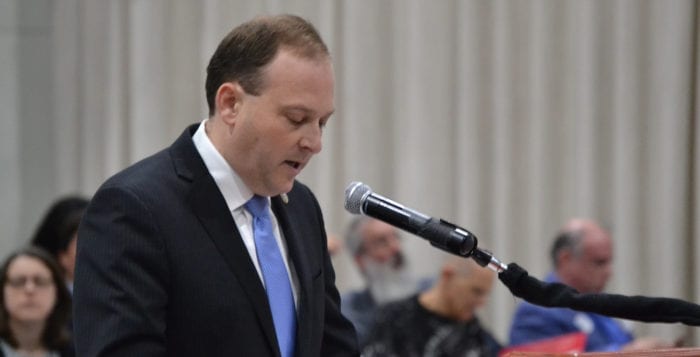Even though it feels like Election Day 2016 was sometime last week, the 2018 midterms are right around the corner.
To that end, U.S. Rep. Lee Zeldin (R-Shirley) hosted a telephone town hall March 14 to give constituents the opportunity to ask questions and hear where he stands on hot-button issues in New York’s 1st
Congressional District. This was one of several telephone town halls Zeldin has hosted since he was re-elected in 2016, though many of his constituents have been rabidly calling for him to host in-person town halls for more than a year, in addition to the three-in-one day town halls he hosted in April 2017, on what some felt was short notice.
“While in D.C. these telephone town halls allow me to reach out to the greatest number of constituents at once, allowing me to listen to your concerns and answer your questions,” he said on the call. “Listening to your questions and insight is such an important part of my job.”
Zeldin fielded about 10 questions during the 60-minute call on a wide array of topics. Below are some of the highlights, with questions bolded and lightly edited for grammar and clarity.
Michael: “I did vote for [President Donald] Trump (R)], but I was very disturbed when he said what he said as far as due process and our Second Amendment rights, taking guns away from people that may be perceived as not having any business having them. I wanted to be assured that you would do your part to remind our president that due process does not come second.”
“I totally agree with you, due process is incredibly important,” Zeldin said, though he offered some qualifiers that sounded as though there was at least some common ground between his position and what Trump said during a televised listening session with survivors of the February shooting in Parkland, Florida. Trump suggested that those who display signs they might be harmful to themselves or others should have guns seized immediately, prior to a crime being committed, due process be damned. He has since backed off from that sentiment.
“It’s important that we’re doing what we need to do, smart policy to keep people safe,” Zeldin said. “There were so many balls that were dropped in Parkland, at different levels of government … People who are
saying Nikolas Cruz shouldn’t have had access to a particular kind of firearm, I’ll say, a guy who shows — I don’t care if he’s 19 or 89 — anyone who is showing all of those threats and indicators, they should not have access to any firearm.”
Zeldin also reiterated his support for the Second Amendment and citizens’ right to bear arms. He also in response to a later question said he thought it was great that high school students locally and nationally are
educating themselves on issues and making their opinions known.
Nora: “In regard to the opioid epidemic, I realize that lots of funding keeps on being funneled toward this crisis, and I see that police are arresting more and more of the drug dealers. I’m not seeing in the hospital setting that the people themselves who are taking the drugs or addicted are getting the help they need. Are there any plans to build facilities for people to get the help they need before they die?”
Zeldin responded to Nora, who said she is a nurse at Stony Brook University Hospital, by saying in a discussion he was involved in with several generals discussing the future of foreign diplomacy, he relayed to them that opioid addiction is nearing the level of a national security threat. The congressman touted previously passed legislation, specifically the Comprehensive Addiction and Recovery Act of 2016, an $8.3 billion plan to fight drug addiction in the United States, with a significant amount of funding for prevention and treatment, and added that the bill needed repeated funding annually.
He mentioned a need to improve the quality of treatment facilities or sober homes, as well as legislation that would help to prevent the practice of “doctor shopping,” or seeking prescriptions for pain medications to feed opioid addiction. However, he fairly quickly pivoted to border security.
“When we talk about border security or people entering our country, what often gets lost in that is this is also illegal substances as well,” he said.
Frank: “Nationally there needs to be some support of President Trump in stopping illegal immigration, and what I was concerned about locally is my understanding is that there are many areas on Long Island that support sanctuary status — it’s a blatant disregard for federal law and something needs to be done about this.”
“I’m with you,” Zeldin said. He went on to name a number of examples of illegal immigrants committing violent crimes in cities around the United States as evidence the practice of protecting illegal immigrants from federal prosecution simply for that reason needing to be ended. “The sanctuary city policies we see across the country are so wrong. The federal government is responsible for creating immigration law in this country, and where you have local politicians pandering for votes and refusing to assist … you’re putting our law enforcement officers at risk. I have colleagues that celebrate illegal immigration.”
The full recording of the town hall can be heard on Zeldin’s website, www.zeldin.house.gov.





